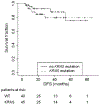KRAS and BRAF mutations in patients with rectal cancer treated with preoperative chemoradiotherapy
- PMID: 19913317
- PMCID: PMC7373270
- DOI: 10.1016/j.radonc.2009.10.001
KRAS and BRAF mutations in patients with rectal cancer treated with preoperative chemoradiotherapy
Abstract
Background and purpose: KRAS and BRAF are mutated in 35% and 10% of colorectal cancers, respectively. However, data specifically for locally advanced rectal cancers are scarce, and the frequency of KRAS mutations in codons 61 and 146 remains to be established.
Materials and methods: DNA was isolated from pre-therapeutic biopsies of 94 patients who were treated within two phase-III clinical trials receiving preoperative chemoradiotherapy. Mutation status of KRAS exons 1-3 and BRAF exon 15 was established using the ABI PRISM Big Dye Sequencing Kit and subsequently correlated with clinical parameters.
Results: Overall, KRAS was mutated in 45 patients (48%). Twenty-nine mutations (64%) were located in codon 12, 10 mutations (22%) in codon 13, and 3 mutations (7%) in codons 61 and 146. No V600E BRAF mutation was detected. The presence of KRAS mutations was correlated neither with tumor response or lymph node status after preoperative chemoradiotherapy nor with overall survival or disease-free survival. When KRAS exon 1 mutations were separated based on the amino-acid exchange, we again failed to detect significant correlations (p=0.052). However, G12V mutations appeared to be associated with higher rates of tumor regression than G13D mutations (p=0.012).
Conclusion: We are the first to report the mutation status of KRAS and BRAF in pre-therapeutic biopsies from locally advanced rectal cancers. The high number of KRAS mutations in codons 61 and 146 emphasizes the importance to expand current mutation analyses, whereas BRAF mutations are not relevant for rectal carcinogenesis. Although the KRAS mutation status was not correlated with response, the subtle difference between G12V and G13D mutations warrants analysis of a larger patient population.
Copyright 2009 Elsevier Ireland Ltd. All rights reserved.
Figures
References
-
- Hoshino R, Chatani Y, Yamori T, et al. Constitutive activation of the 41-/43-kDa mitogen-activated protein kinase signaling pathway in human tumors. Oncogene 1999;18:813–22. - PubMed
-
- Wang L, Cunningham JM, Winters JL, et al. BRAF mutations in colon cancer are not likely attributable to defective DNA mismatch repair. Cancer Res 2003;63:5209–12. - PubMed
-
- Karapetis CS, Khambata-Ford S, Jonker DJ, et al. K-ras mutations and benefit from cetuximab in advanced colorectal cancer. N Engl J Med 2008;359:1757–65. - PubMed
-
- Van Cutsem E, Kohne CH, Hitre E, et al. Cetuximab and chemotherapy as initial treatment for metastatic colorectal cancer. N Engl J Med 2009;360:1408–17. - PubMed
Publication types
MeSH terms
Substances
Grants and funding
LinkOut - more resources
Full Text Sources
Research Materials
Miscellaneous



